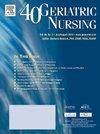Effects of comprehensive intervention models on cognitive frailty in community-dwelling older adults: A 12-month follow-up study
IF 2.5
3区 医学
Q3 GERIATRICS & GERONTOLOGY
引用次数: 0
Abstract
Background
Cognitive frailty (CF) is of concern because of its high prevalence in older population and its close association with adverse health outcomes. However, interventions against CF in China are relatively simple. Therefore, the purpose of this study was to analyse the effects of comprehensive interventions on CF in community-dwelling older adults.
Methods
225 participants, including 108 individuals with reversible CF (RCF) and 117 individuals with potentially RCF (PRCF) were recruited and divided into intervention and control groups. Participants in RCF Intervention Group underwent primary intervention, and participants in PRCF Intervention Group underwent secondary intervention. CF reversal rate and MoCA score were recorded.
Results
Primary intervention and secondary intervention could well reversed CF. Additionally, MoCA scores changed significantly.
Conclusions
Adhering to regular comprehensive interventions can effectively reverse CF for community-dwelling older adults. Additionally, RCF maybe is an effective target for reversing CF via early intervention.
综合干预模式对社区老年人认知衰弱的影响:一项为期12个月的随访研究
认知衰弱(CF)因其在老年人群中的高患病率和与不良健康结果的密切关系而受到关注。然而,在中国,针对CF的干预措施相对简单。因此,本研究的目的是分析综合干预对社区居住老年人CF的影响。方法招募225例受试者,其中可逆性CF (RCF) 108例,潜在RCF (PRCF) 117例,分为干预组和对照组。RCF干预组采用初级干预,PRCF干预组采用二级干预。记录CF逆转率和MoCA评分。结果初级干预和二级干预均能逆转CF, MoCA评分变化显著。结论坚持定期综合干预可有效逆转社区居住老年人CF。此外,RCF可能是通过早期干预逆转CF的有效靶点。
本文章由计算机程序翻译,如有差异,请以英文原文为准。
求助全文
约1分钟内获得全文
求助全文
来源期刊

Geriatric Nursing
医学-护理
CiteScore
3.80
自引率
7.40%
发文量
257
审稿时长
>12 weeks
期刊介绍:
Geriatric Nursing is a comprehensive source for clinical information and management advice relating to the care of older adults. The journal''s peer-reviewed articles report the latest developments in the management of acute and chronic disorders and provide practical advice on care of older adults across the long term continuum. Geriatric Nursing addresses current issues related to drugs, advance directives, staff development and management, legal issues, client and caregiver education, infection control, and other topics. The journal is written specifically for nurses and nurse practitioners who work with older adults in any care setting.
 求助内容:
求助内容: 应助结果提醒方式:
应助结果提醒方式:


